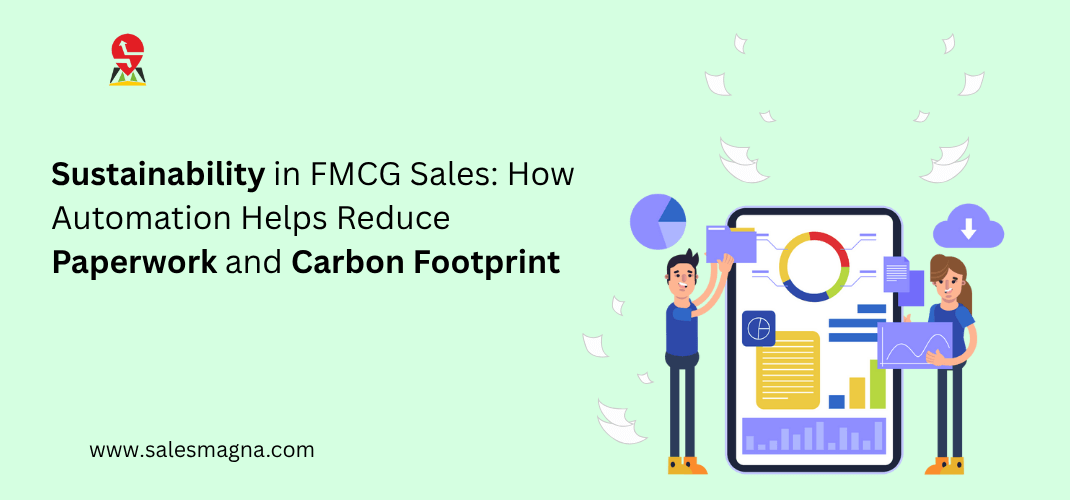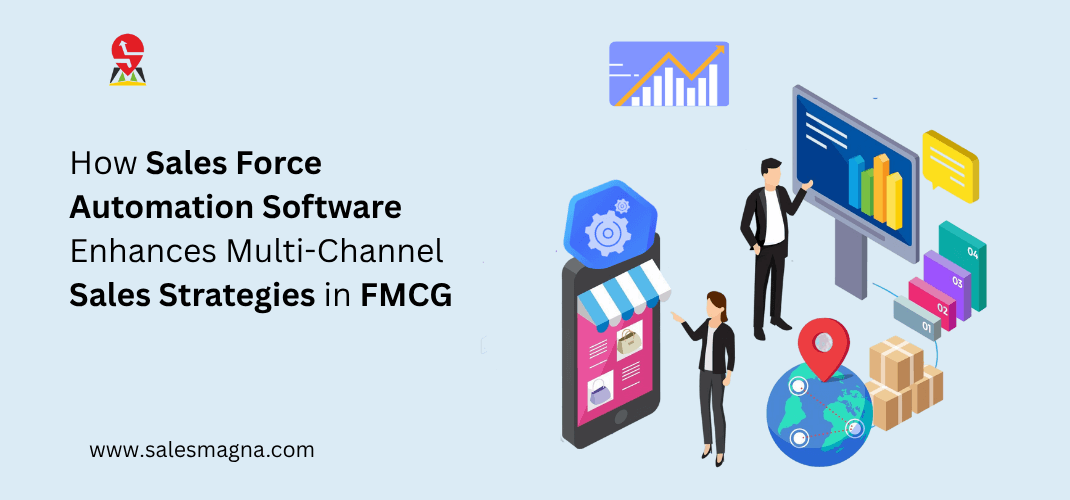Sustainability is no longer a buzzword or a passing trend, it has become an essential aspect of how modern businesses operate. The FMCG industry, with its wide-reaching supply chains, high-volume transactions, and large field teams, has a critical role to play in reducing environmental impact. While most companies focus on reducing plastic in packaging or optimizing logistics, another powerful lever often goes unnoticed – field sales automation.
Field force automation software not only improves sales productivity and visibility but also plays a significant role in reducing a company’s carbon footprint. By eliminating paperwork, reducing travel, and encouraging data-driven decision-making, sales automation helps FMCG companies move toward a more sustainable future.
Paperless Operations in Sales Workflows
One of the most obvious benefits of adopting field force automation is the drastic reduction in paper usage. Traditional sales reporting requires physical forms, daily sales sheets, expense claims, tour plans, and order books. Multiplied across a field team of hundreds or thousands, this paper usage creates a substantial environmental burden over time.
Field force automation replaces all these paper-based processes with digital alternatives. Sales representatives can record attendance, submit expense claims, capture order details, upload photos, and collect customer data using their mobile devices. Managers access this data in real time through web dashboards, eliminating the need for printed reports, physical documentation, and manual filing.
This move to digital documentation reduces the demand for paper, printer ink, courier delivery of reports, and physical storage space. It also helps avoid document loss or duplication and reduces the cost of administrative support.
Reduced Carbon Emissions from Field Travel
In manual systems, field representatives often travel to head offices to submit reports, collect beat plans, or attend planning meetings. These routine trips, especially when duplicated by large teams, contribute to unnecessary fuel consumption and greenhouse gas emissions.
With real-time communication features built into field automation apps, these trips become unnecessary. Supervisors and managers can assign tasks, monitor progress, and approve expenses remotely. Sales representatives receive their plans, targets, and performance feedback directly on their devices, even if they are working from remote areas.
This streamlined communication cuts down on unnecessary travel, helping reduce fuel usage and vehicle emissions. Over time, this shift contributes to more sustainable field operations without compromising productivity.
Route Optimization for Efficient Sales Visits
A powerful yet often underused feature of modern sales automation software is smart route planning. Using GPS data, geo-fencing, and historical visit data, the software can generate optimized travel routes for field representatives. These routes minimize travel distance while ensuring that all required outlets are covered.
Better routing leads to less time spent on the road, lower fuel consumption, and reduced wear and tear on vehicles. Sales reps become more productive, as they can visit more outlets in less time. The environmental benefits of route optimization compound as the number of reps and visits scale up across regions.
Cloud-Based Storage Instead of Physical Archives
Before digital tools became the norm, sales data was stored in the form of physical files—purchase orders, visit logs, claims, and customer feedback forms all required secure storage. These documents consumed physical space, required air-conditioned storage rooms to prevent degradation, and used electricity for lighting and file retrieval systems.
Automation shifts this storage to the cloud. All data generated in the field is instantly stored on secure cloud servers and is accessible to authorized users from any location. This not only speeds up retrieval and ensures backup security but also eliminates the need for energy-consuming, space-intensive file management.
Instant Claims and Reporting
Expense claims, order corrections, and feedback requests are often submitted manually in traditional systems, requiring paper bills, handwritten summaries, and physical manager approvals. This not only delays the process but also increases paper dependency.
With field automation tools, all of this can be handled digitally. Sales reps can take a picture of the bill, fill in details through a mobile form, and submit it instantly for manager review. Managers can view, approve, or reject claims with a single click. The entire workflow is seamless, fast, and free from printed documents.
By removing the need for printed bills, forms, and reports, companies reduce waste while speeding up business processes—a win-win for efficiency and sustainability.
Offline Support for Remote Areas
In rural or low-connectivity regions, traditional fieldwork often means taking manual notes during the day and entering them into the system later. This duplication leads to more paperwork and increased chances of errors or lost data.
Field automation platforms that support offline data entry help solve this challenge. Sales representatives can use the mobile app to record orders, attendance, or visits even without internet access. Once the device reconnects to the internet, the data syncs automatically. This ensures accurate reporting without needing paper backups or repeated entries, reducing both waste and effort.
Smarter Decisions, Less Waste
Automation provides FMCG companies with real-time analytics on sales trends, order frequency, customer behavior, and outlet performance. These insights lead to better planning. For example, companies can avoid overstocking low-demand products, redirect reps based on performance data, or time promotional visits more effectively.
Smart decisions result in less expired stock, fewer returns, and more precise use of sales resources. This operational precision reduces waste across the entire supply chain and minimizes unnecessary sales trips, ultimately lowering the company’s carbon footprint.
Supporting an Environmentally Responsible Brand Image
Consumers are increasingly aligned with brands that demonstrate responsible business practices. Going paperless and using environmentally conscious technology in field operations signals to customers, partners, and employees that sustainability is a priority.
Sales automation enables businesses to operate leaner and cleaner. As regulatory bodies and large retail chains demand more transparency into sustainability practices, this shift to digital operations provides documentation and proof that the company is aligned with green initiatives.
Conclusion
Sustainability in FMCG sales extends beyond packaging or transport logistics. The everyday operations of sales teams, especially the use of paper and travel in manual reporting systems, represent a significant opportunity for change. By embracing field force automation software, FMCG companies not only streamline their operations but also take a meaningful step toward reducing their environmental footprint.
Through paperless reporting, optimized travel, real-time communication, and smart decision-making, sales automation plays a pivotal role in modern sustainability efforts. For FMCG businesses looking to scale responsibly and lead by example, automation is not just a tool, it is a commitment to building a more sustainable future.

